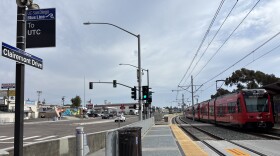GLORIA PENNER (Host): Also in the news the Chargers, players, and coaches have their sights set on winning the AFC West and they’re hoping for a deep run in the playoffs. But the larger Chargers organization is looking much further down into the future and now has its sights on a new downtown stadium near Petco Park. What brought them back to San Diego and that location, and should public money be used to help fund a new stadium for the team? Why has the Chargers focus now turned to the City of San Diego and this site where the old Wonder Bread building used to sit?
DAVID ROLLAND (San Diego CityBeat): I think the City of San Diego and a lot of the residents and the Chargers, I think, naturally would think of the City of San Diego as their first choice. If they can come up with a way to stay in the city, that would be their first choice. Much more preferable than Chula Vista, or Escondido, or Oceanside. I think naturally they would just want to be in the city of San Diego, so that makes sense to me.
PENNER: But you haven’t answered why. You want to answer why?
BARBARA BRY (SDNN.com): Sure. It’s a more central location. The infrastructure is already in for parking, for public transportation. So I think those are two big reasons. The central location, the parking, and the public transportation access.
PENNER: What about the enthusiasm of the mayor and his staff, and other public officials for this particular site?
BRY: Well yes, Mayor Sanders is excited. I mean, so are mayors of other communities excited, but I think the central location in downtown is a major plus for the Chargers.
PENNER: Where does this excitement come from? I mean, it wasn’t too long ago that the mayor said this is neither the time nor does the city have the money to even pursue this as an option. Why are they excited now? Or are we in better shape financially?
ROLLAND: No. We most certainly are not. We’re in worse shape. The only think that I can really think – to answer your question – is that Mayor Sanders took some heat back when he simply would not take a stand either way on the Chargers. He wouldn’t meet with them, he wouldn’t talk to them. He didn’t want to say either way. He just kind of stayed out of it. He took some heat in the press for that, for not showing some leadership on it. So I suppose that he is trying to show some leadership. And I think probably with the downtown site you're talking about public money, but you’re talking about redevelopment money so it’s a little bit more of a complicated topic rather than if you were saying we’re just going to spend some money out of the city general fund for this. Redevelopment money would be money that otherwise would either go back to the state for the state to use or it would be money that could only be used downtown for very specific purposes. So I think maybe he’s thinking that the Chargers and the city could make a case that this is a good expenditure of redevelopment money.
PENNER: But it’s still public money. Is it not? I mean the team says it’s going to need – they’re really clear, Mark Fabiani is very clear, he’s the council. He says the team is going to need public money to help pay for the stadium.
BRY: Well, Gloria, I do have a proposal and I’d love to hear from the viewers. So according to an Associated Press story this morning, the Chargers said they would commit $200 million of the estimated $800 million cost of building a stadium downtown. So my proposal is create something called Downtown Stadium Corporation and let football fans from all over the country own a piece of the stadium. Not own a piece of the Chargers, but own a piece of the stadium and in exchange get discounts on any event that is held at the stadium and get a little button saying “I own part of the stadium.” Or a bumper sticker for their car, “I own part of the stadium.” People should never expect to make a return on their investment because stadiums do not make money, but it might be a public-spirited way of raising money.
PENNER: Well it’s an inventive thought, but I don’t see how… David, react to this thought. I mean who is going to pay the operating expenses for the stadium? What would the Chargers be responsible for if the public could buy into it?
ROLLAND: Look; if people want to help the Chargers buy a new stadium, it’s a private business. If they want to get people to help them raise money, that’s fine with me. I would cut it off. These are tough times as you mentioned. I would cut it off at any public money. You know, if we’re talking about redevelopment money, that’s money that I personally would rater have go back to the state, which has had to cut lots and lots of social services.
PENNER: Just very briefly, David, won’t people have to vote if public money is going to go to the Chargers?
ROLLAND: I’m not sure. I think it depends on how much public money and how much of a benefit a private business would gain from it. I'm actually not sure, but I think that the Chargers have talked about putting it to a vote no matter what, whether they have to or not.
BRY: David’s right. The Chargers have said that. If redevelopment money is used apparently we don’t need a vote of the people, but you have to get the approval of two departments at the State of California level in five cities, including the City of San Diego.
PENNER: Well we’ll keep watching this. Thank you very much Barbara Bry, David Rolland.








